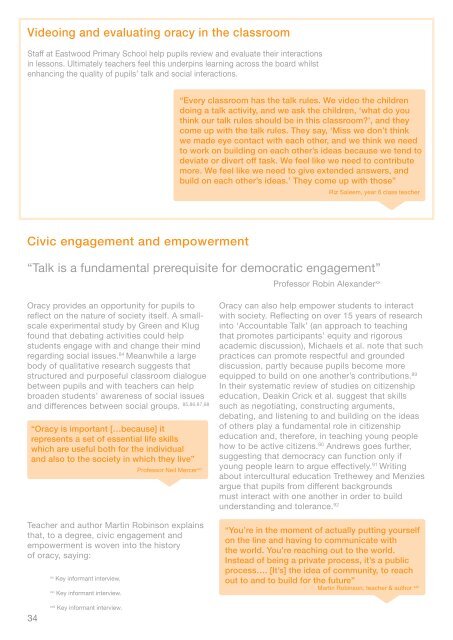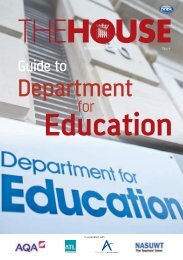Oracy
2fcBkno
2fcBkno
You also want an ePaper? Increase the reach of your titles
YUMPU automatically turns print PDFs into web optimized ePapers that Google loves.
Videoing and evaluating oracy in the classroom<br />
Staff at Eastwood Primary School help pupils review and evaluate their interactions<br />
in lessons. Ultimately teachers feel this underpins learning across the board whilst<br />
enhancing the quality of pupils’ talk and social interactions.<br />
“Every classroom has the talk rules. We video the children<br />
doing a talk activity, and we ask the children, ‘what do you<br />
think our talk rules should be in this classroom?’, and they<br />
come up with the talk rules. They say, ‘Miss we don’t think<br />
we made eye contact with each other, and we think we need<br />
to work on building on each other’s ideas because we tend to<br />
deviate or divert off task. We feel like we need to contribute<br />
more. We feel like we need to give extended answers, and<br />
build on each other’s ideas.’ They come up with those”<br />
Riz Saleem, year 6 class teacher<br />
Civic engagement and empowerment<br />
“Talk is a fundamental prerequisite for democratic engagement”<br />
Professor Robin Alexander xx<br />
<strong>Oracy</strong> provides an opportunity for pupils to<br />
reflect on the nature of society itself. A smallscale<br />
experimental study by Green and Klug<br />
found that debating activities could help<br />
students engage with and change their mind<br />
regarding social issues. 84 Meanwhile a large<br />
body of qualitative research suggests that<br />
structured and purposeful classroom dialogue<br />
between pupils and with teachers can help<br />
broaden students’ awareness of social issues<br />
and differences between social groups. 85,86,87,88<br />
“<strong>Oracy</strong> is important […because] it<br />
represents a set of essential life skills<br />
which are useful both for the individual<br />
and also to the society in which they live”<br />
Professor Neil Mercer xxi<br />
Teacher and author Martin Robinson explains<br />
that, to a degree, civic engagement and<br />
empowerment is woven into the history<br />
of oracy, saying:<br />
xx<br />
Key informant interview.<br />
xxi<br />
Key informant interview.<br />
<strong>Oracy</strong> can also help empower students to interact<br />
with society. Reflecting on over 15 years of research<br />
into ‘Accountable Talk’ (an approach to teaching<br />
that promotes participants’ equity and rigorous<br />
academic discussion), Michaels et al. note that such<br />
practices can promote respectful and grounded<br />
discussion, partly because pupils become more<br />
equipped to build on one another’s contributions. 89<br />
In their systematic review of studies on citizenship<br />
education, Deakin Crick et al. suggest that skills<br />
such as negotiating, constructing arguments,<br />
debating, and listening to and building on the ideas<br />
of others play a fundamental role in citizenship<br />
education and, therefore, in teaching young people<br />
how to be active citizens. 90 Andrews goes further,<br />
suggesting that democracy can function only if<br />
young people learn to argue effectively. 91 Writing<br />
about intercultural education Trethewey and Menzies<br />
argue that pupils from different backgrounds<br />
must interact with one another in order to build<br />
understanding and tolerance. 92<br />
“You’re in the moment of actually putting yourself<br />
on the line and having to communicate with<br />
the world. You’re reaching out to the world.<br />
Instead of being a private process, it’s a public<br />
process…. [It’s] the idea of community, to reach<br />
out to and to build for the future”<br />
Martin Robinson, teacher & author xxii<br />
34<br />
xxii<br />
Key informant interview.




